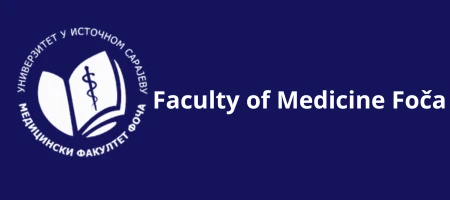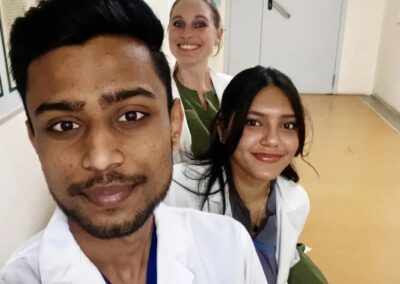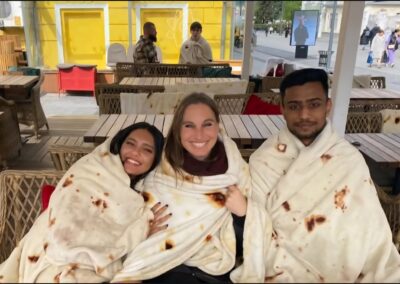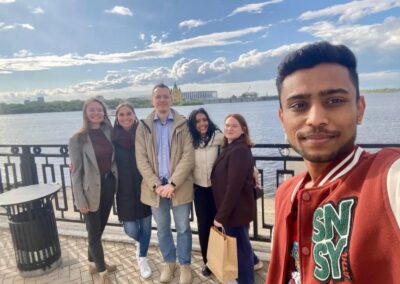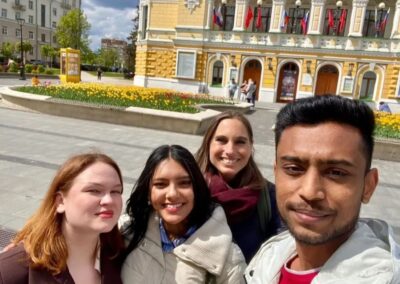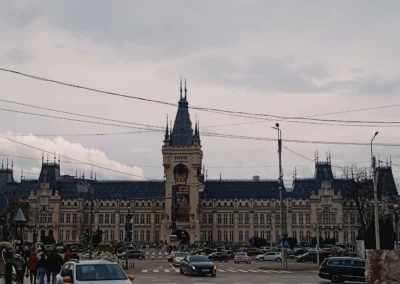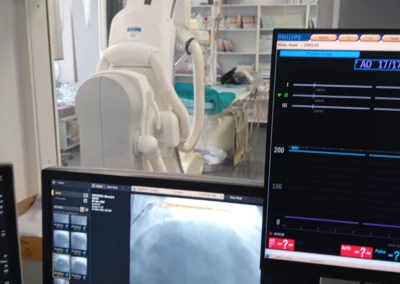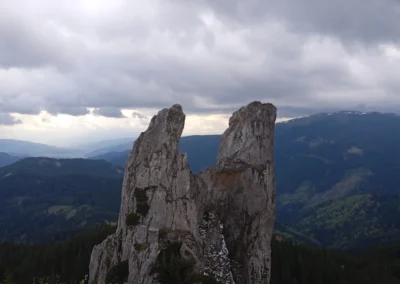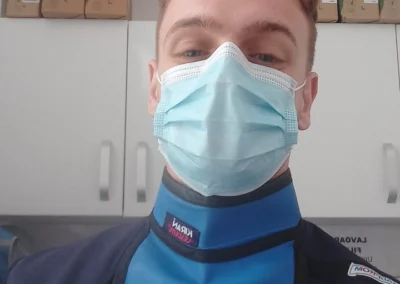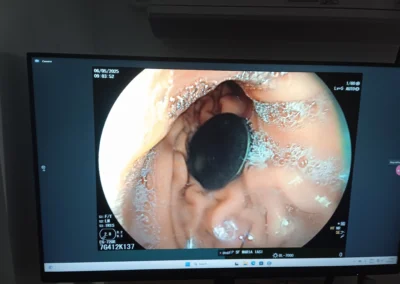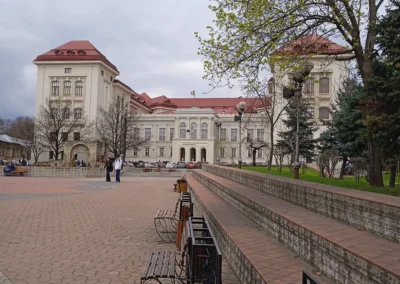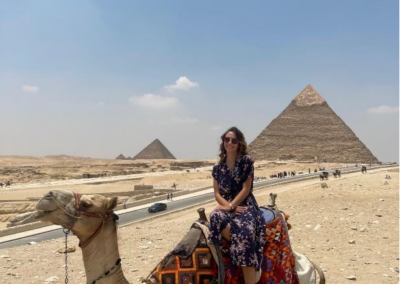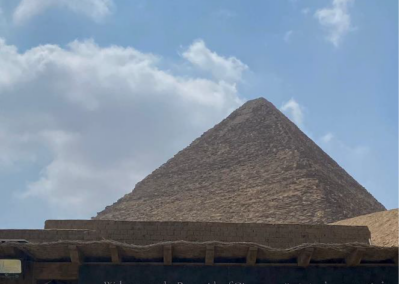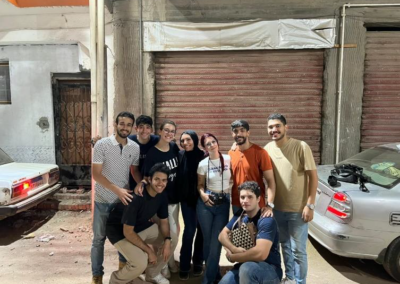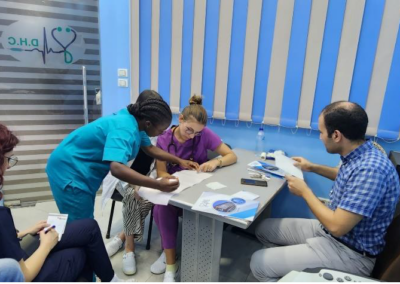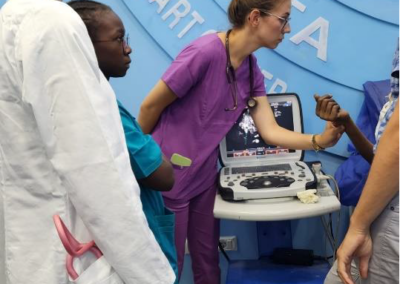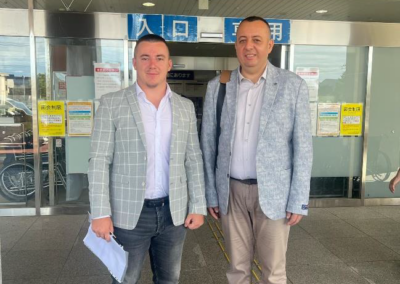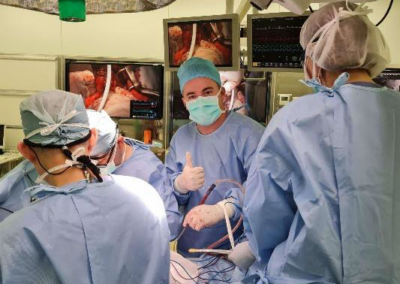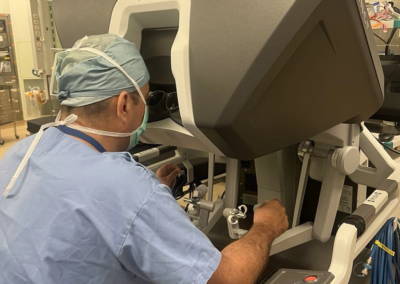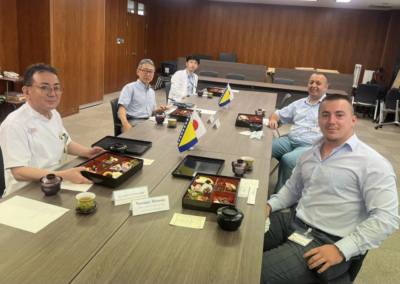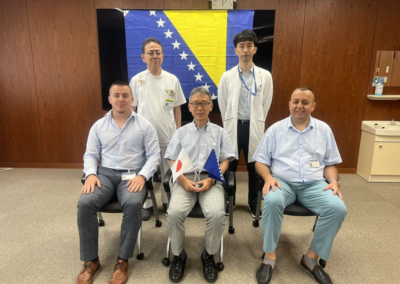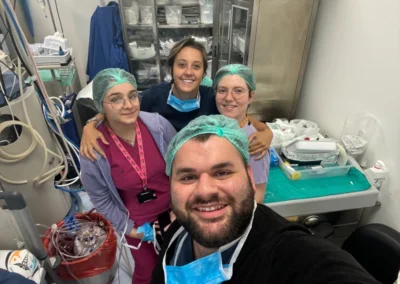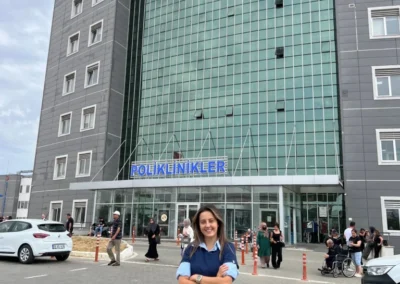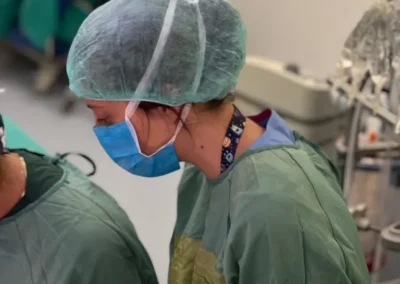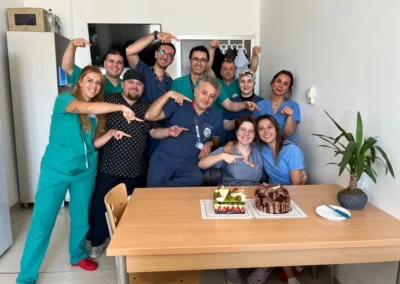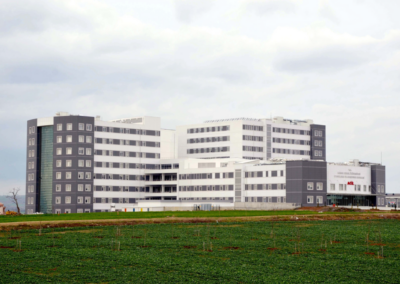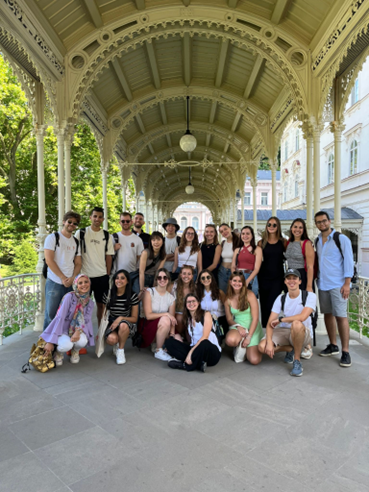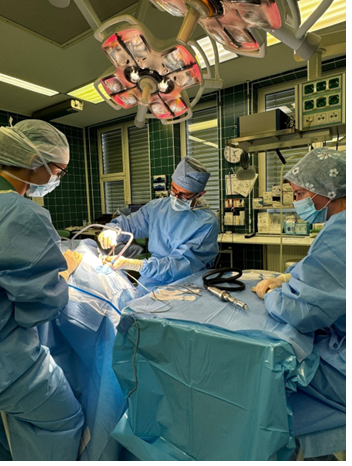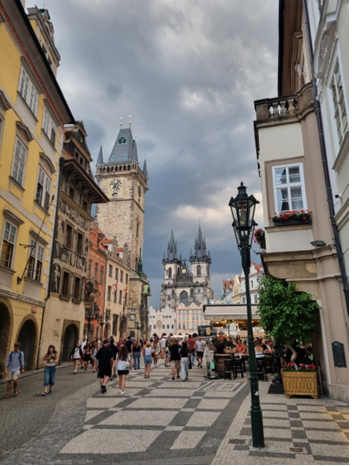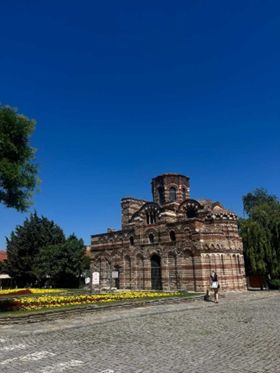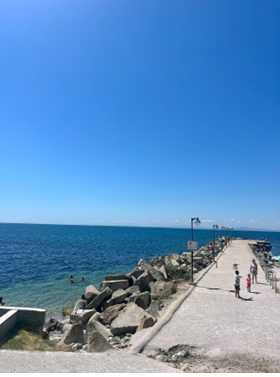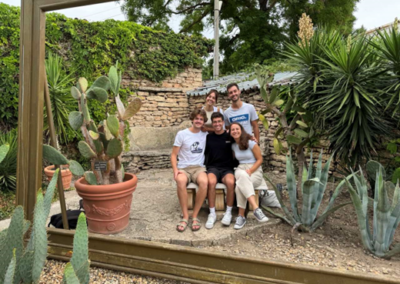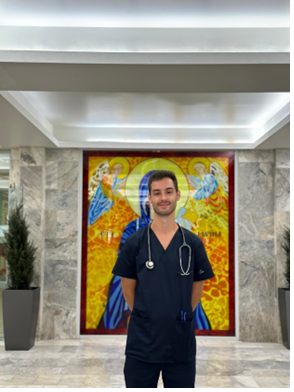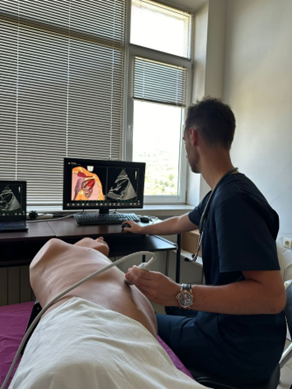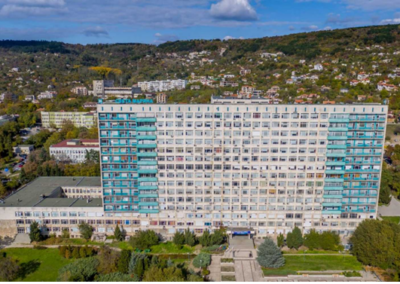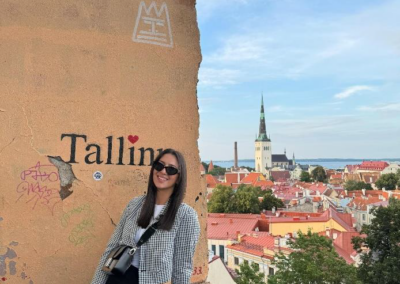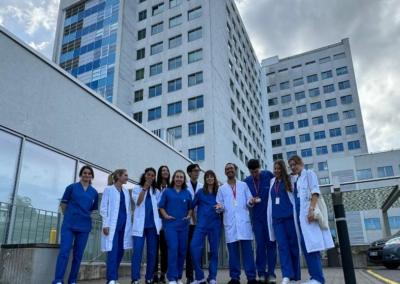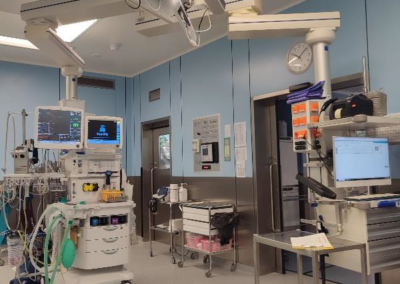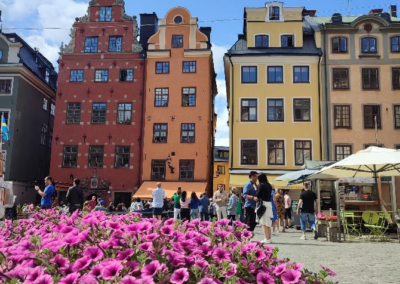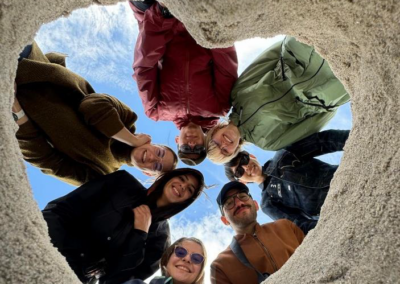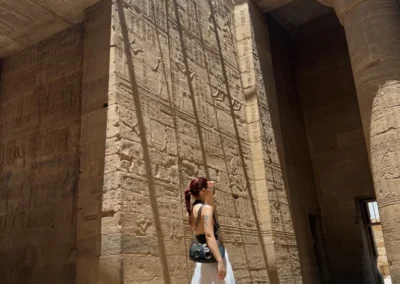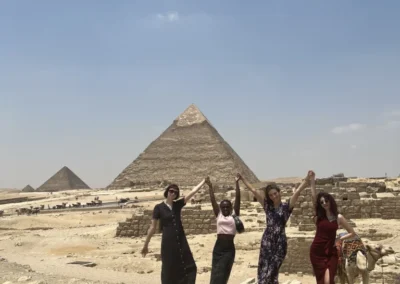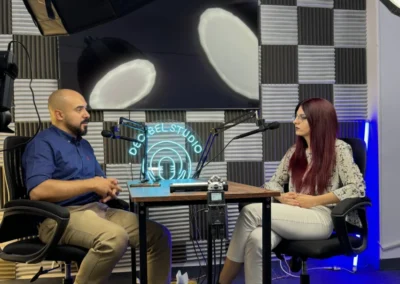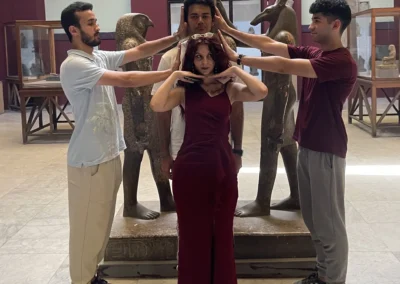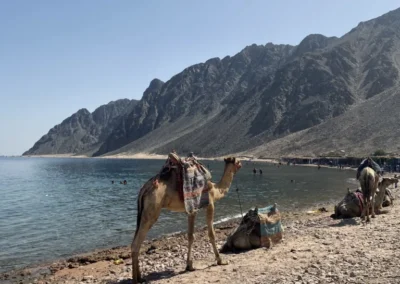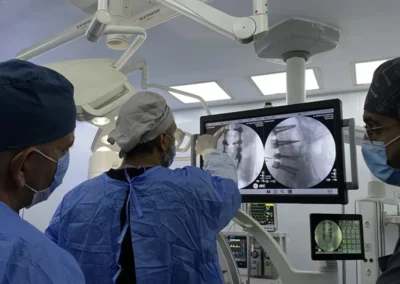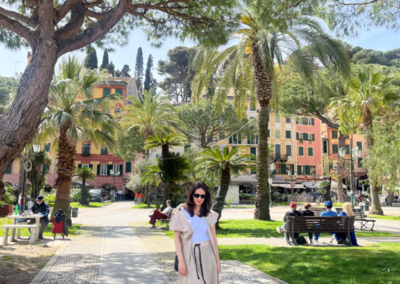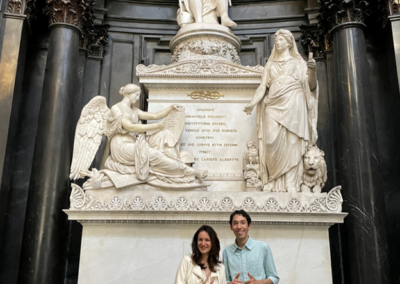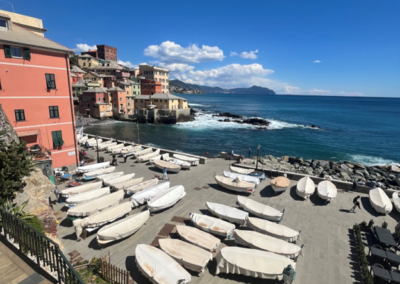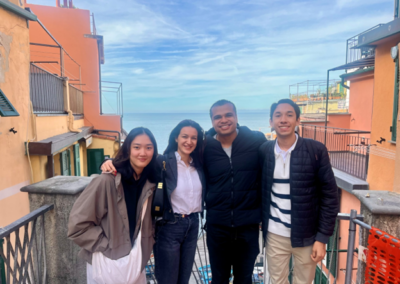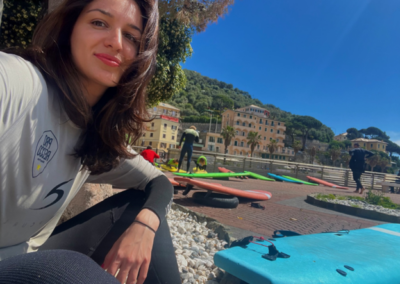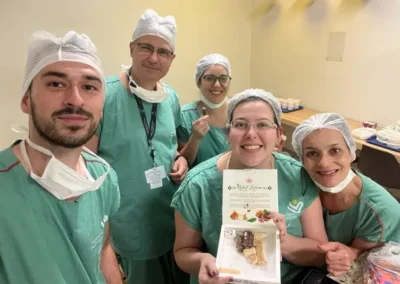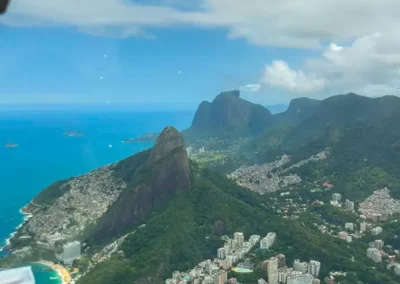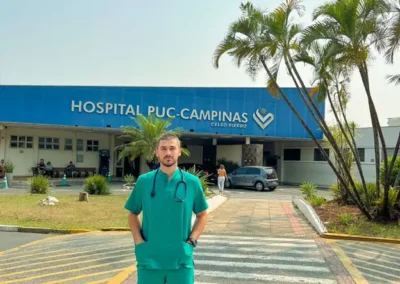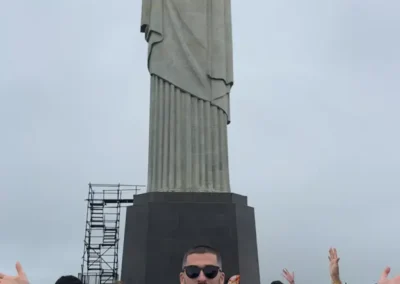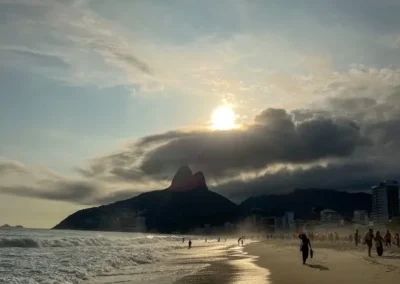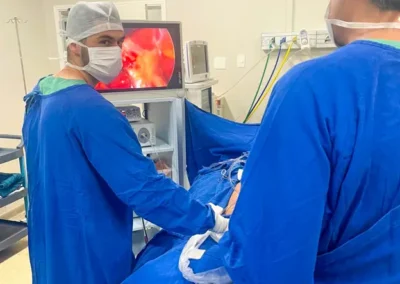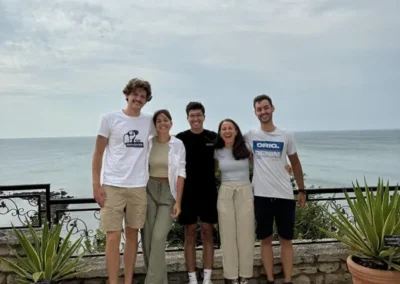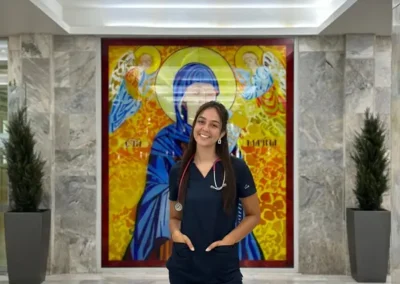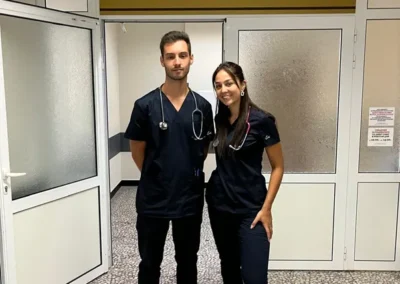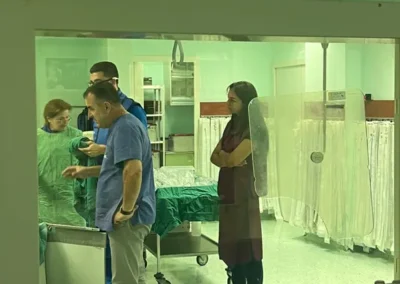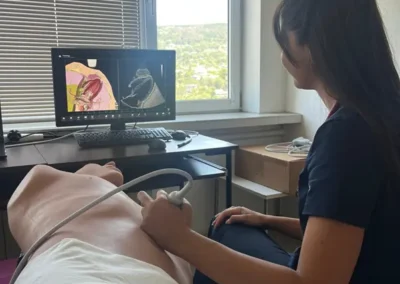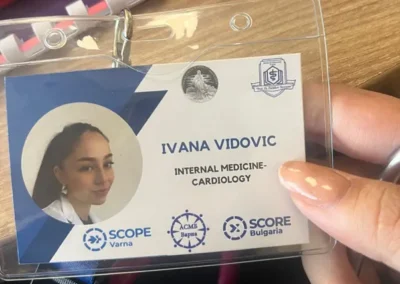STUDENTS EXCHANGE EXPERIENCES
Our valuable experience in Nizhny Novgorod, Russia
“Grigore T. Popa” University of Medicine and Pharmacy, Iasi, Romania
It all started with an impulsive decision to apply for the ERASMUS+ internship programme in Romania, and the next thing I knew, I was having the time of my life. I had the opportunity to go on exchange to Iași, Romania for two months. I was able to observe and assist in multiple wards, including surgery, pediatrics, ENT, and cardiology, where I had the most amazing mentors and residents who were always ready to work with me, no matter the time or the problem.
I had the pleasure of observing the working environment on each ward and assisting during some procedures, as well as examining patients (with a bit of help from my mentors to overcome the language barrier).
During this experience, I met some of the most amazing people from all over Europe, who joined me on this journey that became one of the best times of my life, right up to the very last hour of the exchange programme. I hope to see them again very soon.
I also had an incredible clinical coordinator who was always on standby to help me with my clinical experience at any moment, so I would like to send a special thank-you to Prof. Elena Cojocaru.
The city itself is incredible—full of welcoming people, no matter where you find yourself. Beyond the hospital walls, traveling through Romania gave me the chance to explore its rich culture, stunning landscapes, and historic landmarks, adding even more depth to this unforgettable experience. And special thanks to the ESN (ERASMUS Student Network) members for organizing events for the students, making adaptation to the new environment much easier, and especially for helping me connect with the new friends I met along the way.
Realizing Childhood Dreams
At the end of 2023, when I had the opportunity to travel for a student exchange through SaMSIC and IFMSA, I never imagined that my childhood dreams would come true. The journey of my colleague Sonja Popović and me began in July. Although I had never heard of the “small” city of Zagazig before, its spirit immediately captivated me. The people radiated warmth, and we were so wonderfully welcomed by everyone—from our hosts and the people in restaurants to our professors.
I was initially assigned to the surgery department—neurosurgery—but that didn’t stop me from expanding my interest to other areas of medicine. I visited the Delta Heart Center, a cardiology center in Zagazig, as well as a urology hospital also in Zagazig. I attended and assisted in reconstructive nose surgeries with Dr. Mohamed Salah, a specialist in otorhinolaryngology.
Aside from the days spent in the hospital, we had the opportunity to travel across Egypt. We visited the Red Sea coast, where we met colleagues from all over Europe who were also on student exchange in Egypt this year. We traveled along the Nile and visited temples that have withstood the test of time. We learned about the ancient process of making papyrus and crafting pottery. The feeling of seeing the pyramids for the first time is indescribable, as is witnessing all the artifacts from Ancient Egypt. My journey was filled with laughter, learning, and new friendships, along with plans for a future return to this beautiful country.
Nemanja Mitrović, University of Akita, Japan
In the Land of the Rising Sun
Japan is a fascinating country that blends ancient traditions with the most advanced technology. Japanese minimalism, hospitality, cuisine, cherry blossoms, geishas, and samurais… These are just some of the characteristics that make this wondrous land recognizable, and its technological innovations make it one of the most intriguing places in the world.
I had the distinct honor of, together with Professor Dr. Nenad Lalović, serving as an ambassador of the Medical Faculty of Foča at the prestigious University of Akita in Japan, which has a reputation as a leading educational and research institution in the Tohoku region. The specialized training was in the field of abdominal surgery, where we had the opportunity to observe and participate in the most complex operations, such as kidney transplants, pancreatectomies, and many others. We also practiced robotic surgery, which focuses on using advanced technology in surgical procedures, employing robots as assistants during operations.
During these unforgettable thirty days, we gained incredible experience and formed friendships that transcend borders and cultural differences. We got to know the Japanese tradition, where the fundamental principle of life is: less is more!
We used our free time to visit museums and other tourist attractions, as well as to explore Japan’s bustling capital. Tokyo and Akita represent two faces of Japan—Tokyo is a bustling, modern metropolis full of lights and innovation, while Akita is a tranquil oasis of nature and tradition, surrounded by mountains and fields. While Tokyo offers the vibrant energy of a big city, Akita provides peace and a connection with nature, together making Japan a place of endless contrasts and beauty.
Marija Bjeletić, Namik Kemal University, Turkey
I spent July 2024 on an exchange in Turkey, at Namik Kemal University Hospital, in the cardiovascular surgery department. The month was dynamic, productive, and full of work. I didn’t spend my hours in the clinic or the department, but exclusively in the operating room. I had the opportunity to assist in surgeries, absorbing the “rhythm” of the hospital, the people, and the organization.
Even though I worked with all the doctors and nurses who were there and who welcomed me wonderfully, truly making an effort to show me as much as possible, my supervisor, Dr. Okan, stood out the most. He proved to be a great and humble person, full of patience, understanding, and even the courage to let me try many things. Given the large population, there was no shortage of patients, and every day we performed one bypass surgery and three to five “smaller interventions,” including port openings, varicose veins, dialysis fistulas, carotid plaque removal, embolectomies, and more. Every surgery was more than interesting.
Interpersonal relationships played a key role in the hospital’s daily functioning. A sense of community was present at every turn, from morning meetings to shared coffee breaks. I believe that this sense of camaraderie was enhanced by the similarities in customs and cultures between our people. This connection not only made work easier but also created an atmosphere of trust and friendship. I met many young people, still students or residents, full of enthusiasm, eloquence, and talent, who selflessly devoted themselves to their work. They are truly passionate, dedicated, and seem not to recognize the word “tired.”
There weren’t many social activities since I was the only international student, and most people didn’t speak English. This motivated me to learn Turkish so I could communicate better with the locals. Nevertheless, I enjoyed beautiful moments by the sea, on beaches, and on trips to Istanbul, a place where tradition meets modernity, East meets West.
The area is known for its fish and cheese, as Tekirdağ is an important port in Turkey. Balkan and Turkish cuisines are very similar due to shared history and cultural influences, so dishes like burek, stuffed grape leaves, stuffed peppers, ćevapi (köfte), and baklava have their own versions in Turkish cuisine. It is a must to try kebab, manti, döner, and pide. Of course, each cuisine carries its unique touch, reflecting the culture and tradition of its people.
Upon returning to Bosnia and Herzegovina, it took a few days for all my feelings to come together into a cohesive whole. I know this was a learning experience in many ways, and I learned that the most important things about us lie in how we treat others, in our work, and in our education.
In 2019, I applied for an exchange but was rejected. Although it felt like a significant failure at the time, I realized that everything happens in its own time. Every obstacle can teach us patience and faith in our path. The rejection didn’t mean the end of my dreams, only a delay of what was destined for me. That’s why I encourage everyone to be patient, persistent, not to be demotivated, to work hard, and to believe in themselves, because it is all part of our unique journey.
Katarina Jeftović, Fakultní Nemocnice Královské Vinohrady, Prague, Czech Republic
Ahoj!
This year, I had a fantastic opportunity that I couldn’t miss—spending an entire month abroad. And not just as a tourist, but as a student completing clinical practice. All thanks to the SaMSIC and IFMSA organizations.
I spent August in Prague, doing my clinical internship in the neurosurgery department. In the operating room, I encountered numerous clinical cases, observing an average of four surgeries daily, which greatly enriched my knowledge. The department is equipped with the latest technology, and the staff and doctors are highly skilled, making our practice experience top-notch.
But that’s not all—exchanges offer so much more… daily interactions with students from all over the world, exchanging knowledge on countless topics, sightseeing tours, visits to the famous Czech beer halls, group day trips, picnics, sports activities, cruising on the Vltava River, and much more. I still wonder how so many activities and beautiful moments fit into just thirty days.
My sincerest recommendation to everyone is to seize the chance and go on an exchange. The energy among students abroad, the camaraderie, excitement, kindness, and unity is truly incredible and priceless.
Nikola Košarac, St. Marina’s Hospital Varna, Varna, Bulgaria
The topic of medical student exchange represents a significant opportunity for development and gaining international experience, and my experience, facilitated by the SaMSIC organization, demonstrates how these initiatives can enrich education.
Bulgaria, particularly the city of Varna, provides an exceptional environment for studies and professional growth, with its rich history, beautiful beaches, and vibrant culture that contribute to a high quality of life and work.
Varna, the gem of the Black Sea coast, captivates with its natural beauty and rich cultural heritage. Its golden beaches invite relaxation, while landmarks like the Roman Baths and the Cathedral offer insight into the city’s history. Varna is a lively metropolis hosting numerous festivals, cultural events, and a vibrant nightlife, creating the perfect atmosphere for exploration.
I completed my internship at St. Marina’s Hospital in the department of invasive cardiology, where I had the opportunity to work with a top-tier team performing complex procedures like coronary angiography and percutaneous coronary interventions. A particular focus was also on working with ECGs, where I gained an understanding of their crucial role in diagnosing and monitoring heart conditions before, during, and after interventions.
The exchange provided numerous opportunities to explore Bulgaria and visit many cities whose beauty left us speechless. One of those cities was, in my opinion, a hidden gem of Bulgaria, the old town of Nessebar, whose charm and history were recognized by UNESCO when it was added to the World Heritage List in 1983.
One of the most memorable aspects of this exchange was the friendships I formed. Our daily interactions brought me closer to the culture, traditions, and customs not only of Bulgaria but also of the many other countries represented by my fellow students. The magic of this professional exchange lies not only in the clinical experience or the city itself but also in the people who give it a special meaning and feeling.
Lana Pejić, North Estonia Medical Center, Tallinn, Estonia
Summer on the Baltic
Thanks to SaMSIC and IFMSA, I spent August in Tallinn, the charming Estonian capital, a UNESCO World Heritage site. It’s easy to forget you’re in a modern European capital when you step into the Old Town, which transports you to the medieval era, a time of knights and princesses locked in the city’s surrounding towers.
I completed my internship at the North Estonia Medical Center, in the gynecology and obstetrics department, where I had the privilege of learning from top professionals. Each day, I visited the operating room and witnessed numerous diverse cases. I frequently had the chance to assist in surgeries, which helped me enhance my clinical skills and gain incredible, hands-on experience.
During the exchange, we had a rich social program and the opportunity to immerse ourselves in the host country’s culture. Besides exploring numerous museums, we traveled across the Baltic Sea to neighboring countries, Finland and Sweden, and got to experience a taste of Scandinavia. The most memorable moment was during our return from Stockholm, standing atop the cruise ship, watching the breathtaking northern lights dance over the Baltic Sea.
These unforgettable thirty days introduced me to new cultures, customs, and ways of life. I met many wonderful people and formed lifelong friendships. My stay in Estonia was a delightful experience, and I would wholeheartedly recommend everyone to explore the magic of an exchange program.
Sonja Popović, Sharqia, Egypt (Faculty of Medicine, Zagazig University)
July 2024 in Zagazig, Egypt, is a time I’ll always remember and wish to relive. The warmth and hospitality of the people, the unique and rich history of Egypt, and the multitude of cities and sites—each more fascinating than the last—are just some of the reasons I would recommend everyone visit!
During my time in Zagazig, I had the opportunity to learn from numerous specialists and see firsthand how various fields of medicine (surgery, ENT, psychiatry, cardiology) are practiced in Egypt. Everyone was always eager to generously share their knowledge, advice, and professional experiences. Participating in a student exchange program not only inspires further learning but also shapes you into a better doctor. Plus, the connections you make open up countless opportunities for future training and work.
Beyond the medical experience, I got to immerse myself in a completely different culture, savor delicious cuisine, ride in a tuk-tuk, visit the fortresses of Luxor and Aswan while cruising on the Nile, explore the Alexandria Library and the museums and pyramids of Cairo, scuba dive in Dahab, and witness countless breathtaking scenes worthy of a movie. A month spent this wonderfully flies by, leaving you wishing for more.
A student exchange program helps you become more independent, grow as a person, and gain new experiences, friends, and memories—all while living in a different country, and in my case, even on a different continent. Bring a notebook to jot down all the new medical knowledge, sunscreen for the intense sun, research the stunning places and cities of Egypt well, and get ready for one of the best experiences of your life with your new friends!
Marija Marković, Ospedale San Martino, Genoa, Italy
My name is Marija Marković, a fifth-year medical student at the Faculty of Medicine in Foča. This year, I participated for the first time in an international student exchange program, choosing dermatology—a program I was especially excited about. The dermatology program took place at the Ospedale San Martino in Genoa, Italy, and it was truly a privilege to be part of the medical team there.
First, I would like to express my sincere gratitude to the SaMSIC organization, which made everything possible. Their dedication and the hard work of every member ensured the entire process went smoothly, making the whole experience feel well-orchestrated and effortless. The professional approach and commitment of everyone involved contributed to a program that began and concluded without any issues, providing a seamless and enriching experience.
The impact of this exchange is so profound that I could write pages about it, and perhaps one day, I will. For now, I will keep it concise and share some practical information for colleagues considering a similar experience.
The initial concern is, of course, about getting to your destination and arranging transport. However, after some research, I realized reaching Genoa wasn’t complicated at all, with many travel options available. Once you plan your journey and make the arrangements, the adventure begins. Any worries about fitting in or getting settled are soon forgotten. As soon as you arrive, you can relax and focus on the medical experience ahead, as everything else has already been organized. Accommodation in the student dorms and a well-structured educational program are provided, allowing you to concentrate solely on what matters most: your medical training.
From the moment I arrived, a contact person was there to greet me, escort me to the dorms, and assist me until I settled in. They also explained how to navigate the clinic, what to expect, and emphasized that help was always available whenever needed—a warm and reassuring welcome.
On my first day at the clinic, I wasn’t alone. My contact person guided me through the hospital, explaining how everything worked, introducing me to doctors and staff, and making sure I felt integrated. The welcoming process included detailed instructions, medical screenings, and tests required for everyone working at the clinic, making me feel like a respected part of the team.
The second night, a welcome dinner was organized at an Italian restaurant—Cucina Italiana! It was a multicultural gathering, with our group consisting of five students: my roommate from Thailand, two guys from Brazil, one from Mexico, and me from Serbia. Our Italian colleagues made us feel at home with their warmth and friendliness, and we quickly bonded over shared experiences. The dinner left a lasting impression, and we continued organizing similar gatherings throughout our stay.
We became a close-knit group. After morning duties at the clinic, we would plan weekend trips, share daily highlights, and support each other—not just professionally, but as friends exploring new adventures together.
Of course, the clinic itself was the core of the program. If I had to grade the clinical experience from 1 to 10, I would give it an 11! It exceeded all expectations. The dermatology department at Ospedale San Martino is one of Italy’s leading centers in terms of equipment, quality, and expertise. I rotated through six specialized clinics for different skin conditions, witnessed rare cases I had never seen before, assisted in procedures and biopsies, and examined fascinating changes using a dermatoscope under the guidance of my mentors. I often stayed late voluntarily because of the high patient volume and the uniqueness of each case.
Weekends were reserved for travel, during which we visited eight Italian cities—two every weekend! We explored Florence, Bologna, Lake Garda, and even the hometowns of our local contacts, who acted as our guides, enriching our experience.
I wholeheartedly recommend the exchange program to all colleagues. Experiencing medicine in a different context enhances your professional skills, connects you with colleagues from around the world, and inspires further growth. Isn’t that one of the missions of being a medical professional? I wish future participants not only a quality experience but also an even richer and more unforgettable one. Embrace the opportunity, advance your skills, and enjoy every moment—it’s worth it!
Dajan Simic, Hospital PUC-Kampinas
One of the most exciting and inspiring steps you can take as a medical student is participating in a student exchange program.
In October 2024, I spent time in Brazil at the University Hospital PUC Campinas, São Paulo.
I completed my exchange in the Department of Thoracic Surgery under the mentorship of Dr. Sergio Oliva Banci, but I also had the opportunity to observe and participate in a wide variety of surgeries from other surgical specialties, such as cardiac defect repair, brain and spinal cord tumors, abdominal and inguinal hernias, and many others. The diverse cases I encountered for the first time will certainly remain etched in my memory for a lifetime.
In addition to excellent hands-on practice, I had plenty of time to travel and visit other cities, but the highlight of this trip was undoubtedly Rio de Janeiro. The Christ the Redeemer statue, Sugarloaf Mountain, Ipanema, and Copacabana beaches are just some of the attractions waiting for you there.
The vast offerings of South America’s largest country and the excellent practical experience make for a winning combination, but be prepared for numerous challenges, including a significant language barrier that awaits you.
Ivana Vidovic, “St. Marina” Hospital in Varna
During a one-month medical exchange program in Bulgaria, specifically at the “St. Marina” Hospital in Varna, I had the opportunity to explore various aspects of medical practice and gain significant experience. This professional training was extremely beneficial, both professionally and personally. Through daily work with experienced doctors and hospital staff, I gained a deeper understanding of specific medical procedures and protocols, with particular emphasis on new knowledge in the field of cardiology.
I became familiar with ultrasound diagnostic methods, which are crucial in the daily work of every doctor. Additionally, I had the chance to enhance my clinical knowledge and improve practical skills such as auscultation of heart tones and murmurs, interpreting ECGs, and observing and participating in percutaneous coronary angioplasty procedures.
Moreover, during this exchange, I established many valuable connections with colleagues from Bulgaria as well as with students from other countries. This international collaboration allowed me to expand my professional network and learn about different approaches to medical practice, which will undoubtedly benefit my career.
For me, this was an opportunity not only to advance my medical skills but also to become more acquainted with advanced technologies and methods that will shape the future of medicine. My experience at “St. Marina” Hospital in Varna stands as a significant chapter in my professional education, one that I will undoubtedly use as a foundation for further progress in my medical career.
